(完整)人教版九年级英语第十单元知识点复习总结,推荐文档
Unit10知识重点总结 人教版新目标 英语九年级全册
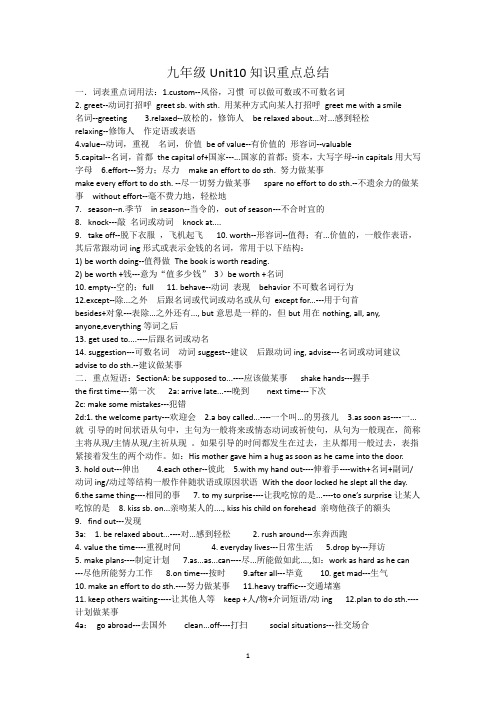
九年级Unit10知识重点总结一.词表重点词用法:1.custom--风俗,习惯可以做可数或不可数名词2.greet--动词打招呼greet sb. with sth. 用某种方式向某人打招呼greet me with a smile名词--greeting 3.relaxed--放松的,修饰人be relaxed about...对...感到轻松relaxing--修饰人作定语或表语4.value--动词,重视名词,价值be of value--有价值的形容词--valuable5.capital--名词,首都the capital of+国家---...国家的首都;资本,大写字母--in capitals用大写字母6.effort---努力;尽力make an effort to do sth. 努力做某事make every effort to do sth. --尽一切努力做某事spare no effort to do sth.--不遗余力的做某事without effort--毫不费力地,轻松地7.season--n.季节in season--当令的,out of season---不合时宜的8.knock---敲名词或动词knock at....9.take off--脱下衣服,飞机起飞10. worth--形容词--值得;有...价值的,一般作表语,其后常跟动词ing形式或表示金钱的名词,常用于以下结构:1)be worth doing--值得做The book is worth reading.2)be worth +钱---意为“值多少钱”3)be worth +名词10.empty--空的;full 11. behave--动词表现behavior不可数名词行为12.except--除...之外后跟名词或代词或动名或从句except for...---用于句首besides+对象---表除...之外还有..., but意思是一样的,但but用在nothing, all, any, anyone,everything等词之后13.get used to....----后跟名词或动名14.suggestion---可数名词动词suggest--建议后跟动词ing, advise---名词或动词建议advise to do sth.--建议做某事二.重点短语:SectionA: be supposed to...----应该做某事shake hands---握手the first time---第一次2a: arrive late...---晚到next time---下次2c: make some mistakes---犯错2d:1. the welcome party---欢迎会 2.a boy called...----一个叫...的男孩儿 3.as soon as----一...就引导的时间状语从句中,主句为一般将来或情态动词或祈使句,从句为一般现在,简称主将从现/主情从现/主祈从现。
人教版九年级上册unit10知识点总结

人教版九年级上册unit10知识点总结Unit10是九年级英语教材中的一单元,主要围绕“Travel Journal”这一话题展开,讲述了各种不同的旅行经历和体验。
本文将以此为主题,总结Unit10涉及到的知识点。
一、旅行方式与准备在Unit10中,我们学到了不同的旅行方式及如何准备出行。
首先,我们了解了不同的交通方式,如飞机、火车、轮船和汽车。
每种交通方式都有自己的优势和劣势,我们可以根据自己的需求和预算来选择最适合的交通工具。
其次,我们学到了旅行所需准备的物品。
无论是短途还是长途旅行,我们都需要准备好必需的衣物、个人用品和旅行文件等。
同时,我们还学到了一些关于目的地的背景知识,如气候、文化习俗等,以便更好地适应和了解我们要去的地方。
二、旅行经历的描写与分享在Unit10中,我们还学到如何描述和分享自己的旅行经历。
我们可以用一些形容词和副词来表达旅行的感受,如令人兴奋的、惊险的、令人难忘的等。
此外,我们还学到了如何用正确的时态和连词来串联我们的句子,使叙述更加连贯和流畅。
通过学习Unit10,我们不仅可以提高自己的语言表达能力,还可以更好地与他人分享旅行的趣事和见闻。
我们可以告诉他人我们去过的地方、参观的景点、品尝的美食以及认识的有趣人物等等,让别人也能感受到我们旅行时的喜悦和惊喜。
三、文化交流与体验在Unit10中,我们还学到了文化交流与体验的重要性。
旅行不仅是一种观光和放松的方式,更是一种了解和体验不同文化的机会。
我们可以通过和当地人交流,参加一些文化活动,品尝当地的美食等方式来更好地了解和融入目的地的文化。
文化交流不仅有助于我们的语言学习,还有助于拓宽我们的视野和增长我们的见识。
在与他人交流的过程中,我们可以了解到不同地方的人们如何生活、如何庆祝重要节日,以及他们的传统艺术和手工艺品等。
通过这些交流与体验,我们可以更好地欣赏和尊重其他文化,从而更好地融入世界的大家庭。
总结:通过学习Unit10,我们不仅仅只是学到了一些旅行的知识和技巧,更重要的是提高了我们的语言表达能力和文化素养。
人教版九年级英语全册Unit10知识点
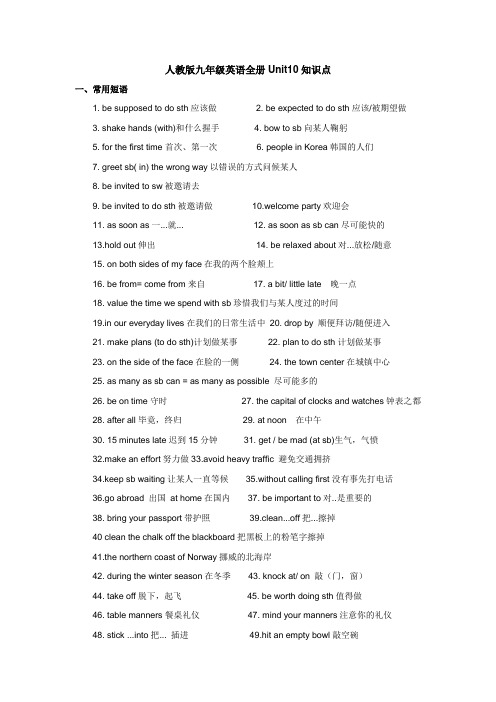
人教版九年级英语全册Unit10知识点一、常用短语1. be supposed to do sth应该做2. be expected to do sth应该/被期望做3. shake hands (with)和什么握手4. bow to sb向某人鞠躬5. for the first time首次、第一次6. people in Korea韩国的人们7. greet sb( in) the wrong way以错误的方式问候某人8. be invited to sw被邀请去9. be invited to do sth被邀请做10.welcome party欢迎会11. as soon as一...就... 12. as soon as sb can尽可能快的13.hold out伸出14. be relaxed about对...放松/随意15. on both sides of my face在我的两个脸颊上16. be from= come from来自17. a bit/ little late 晚一点18. value the time we spend with sb珍惜我们与某人度过的时间19.in our everyday lives在我们的日常生活中20. drop by 顺便拜访/随便进入21. make plans (to do sth)计划做某事22. plan to do sth计划做某事23. on the side of the face在脸的一侧24. the town center在城镇中心25. as many as sb can = as many as possible 尽可能多的26. be on time守时27. the capital of clocks and watches钟表之都28. after all毕竟,终归29. at noon 在中午30. 15 minutes late迟到15分钟31. get / be mad (at sb)生气,气愤32.make an effort努力做33.avoid heavy traffic 避免交通拥挤34.keep sb waiting让某人一直等候35.without calling first没有事先打电话36.go abroad 出国at home在国内37. be important to对..是重要的38. bring your passport带护照39.clean...off把...擦掉40 clean the chalk off the blackboard把黑板上的粉笔字擦掉41.the northern coast of Norway挪威的北海岸42. during the winter season在冬季43. knock at/ on 敲(门,窗)44. take off脱下,起飞45. be worth doing sth值得做46. table manners餐桌礼仪47. mind your manners注意你的礼仪48. stick ...into把... 插进49.hit an empty bowl敲空碗50. point at指着, point to指向(侧重方向51. at the table在餐桌旁52 at table在吃饭53.basic table manners基本的餐桌礼仪54. my biggest challenge我最大的挑战55. on my student exchange program在我的交换生生56.there is no reason to do sth没原因做57. go out of one’s way (to do sth.)特地做某事, 格外努力做58.make sb feel at home使某人感到宾至如归59. a teenage granddaughter一个十几岁的(外)孙女60. talk to sb in French用法语和...交谈61.be comfortable doing舒服/轻松做某事62.behave well/ badly/ politely举止好63. behave oneself举止规矩64. as you can imagine正如你想象的那样65. be different from与...不同66.be / get used to sth习惯于某事be / get used to doing sth.习惯于做某事67. gradually get used to sth逐渐习惯某事68. cut it up把它切开69. eat it with a fork用叉子吃它70.put your elbows on the table把肘部放在桌子上71. have a safe trip一路平安,旅途愉快72. show up 出席,露面,到场二、短语用法集锦1.(1)suppose:猜想;假设suppose that表示“猜测;假设”,that可省例:I suppose he is a student.(2)be supposed to do sth被期望做某事,应该做某事。
九年级英语unit10知识点人教版

九年级英语unit10知识点人教版九年级英语Unit 10知识点梳理九年级英语Unit 10是中学九年级英语教材中的重要一单元。
本单元主要围绕“科技与未来”这一主题展开,涉及到科技的发展、科技的影响以及科技对未来的预测等内容。
以下是对该单元中的重要知识点进行梳理和总结。
一、词汇知识1. Technology(科技):指人类在实践和认识的基础上创造和运用各种各样的人工产品和方法的总和。
2. Invent(发明):指通过创造性思维和实践活动创造、发明新产品、新方法或新方式。
3. Discover(发现):指通过研究、观察或实践活动等方式找到新的事物、现象或知识。
4. Inventor(发明家):指根据自己的创造性思维和实践活动创造新产品、新方法或新方式的人。
5. Internet(互联网):指全球性的计算机网络,通过电信网络连接起来,从而形成一个全球性数据通信网络。
6. Robot(机器人):指能够完成特定任务的自动化机器。
7. Virtual reality(虚拟现实):指通过计算机生成的一种仿真环境,使用户能够与虚拟世界进行交互。
8. Site(网站):指通过互联网发布信息或提供服务的网络空间。
二、语法知识1. Passive voice(被动语态):当我们强调动作的接受者时,可以使用被动语态。
由“be + 过去分词”构成,过去分词作为谓语的主要成分。
例如:The book was written by Mark Twain.(这本书是马克·吐温写的。
)2. Adjective clauses(定语从句):用来修饰名词或代词的从句,通常由关系代词(who, which, that)或关系副词(when, where)引导。
例如:The girl who is sitting next to me is my best friend.(坐在我旁边的女孩是我最好的朋友。
)三、阅读技巧阅读是英语学习的重要环节,九年级英语Unit 10也有涉及到科技和未来的阅读材料。
人教版九年级英语unit10知识点总结
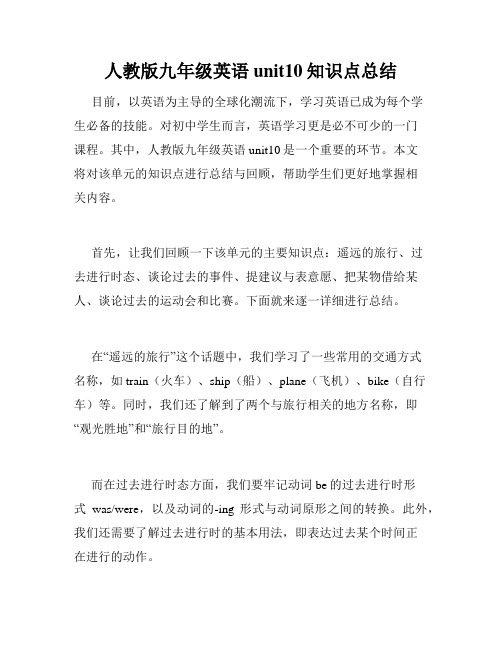
人教版九年级英语unit10知识点总结目前,以英语为主导的全球化潮流下,学习英语已成为每个学生必备的技能。
对初中学生而言,英语学习更是必不可少的一门课程。
其中,人教版九年级英语unit10是一个重要的环节。
本文将对该单元的知识点进行总结与回顾,帮助学生们更好地掌握相关内容。
首先,让我们回顾一下该单元的主要知识点:遥远的旅行、过去进行时态、谈论过去的事件、提建议与表意愿、把某物借给某人、谈论过去的运动会和比赛。
下面就来逐一详细进行总结。
在“遥远的旅行”这个话题中,我们学习了一些常用的交通方式名称,如train(火车)、ship(船)、plane(飞机)、bike(自行车)等。
同时,我们还了解到了两个与旅行相关的地方名称,即“观光胜地”和“旅行目的地”。
而在过去进行时态方面,我们要牢记动词be的过去进行时形式was/were,以及动词的-ing形式与动词原形之间的转换。
此外,我们还需要了解过去进行时的基本用法,即表达过去某个时间正在进行的动作。
接着,我们要回顾如何谈论过去的事件。
首先,我们需要学习一些表示过去的时间状语,如yesterday(昨天)、last week(上周)、a few days ago(几天前)等。
同时,我们也要掌握一些表示过去事件的动词短语,如have fun(玩得开心)、go swimming (去游泳)等。
在提建议与表意愿的部分,我们学习了一些有用的句型和表达方式,如Why don't you / we do sth?(为什么不……?)、How about…?(……怎么样?)、I'd like to…(我想……)等。
通过这些句型和表达方式,我们可以更流利地提出建议和表达自己的意愿。
继而,我们来看一下如何表达把某物借给某人。
在这一部分,我们学习了表示“借给某人”这一行为的动词短语lend…to…,以及相关的宾语和介词。
同时,我们还学习了表示“向某人借某物”的另一种表达方式,即borrow…from…。
人教版英语九年级unit10知识点
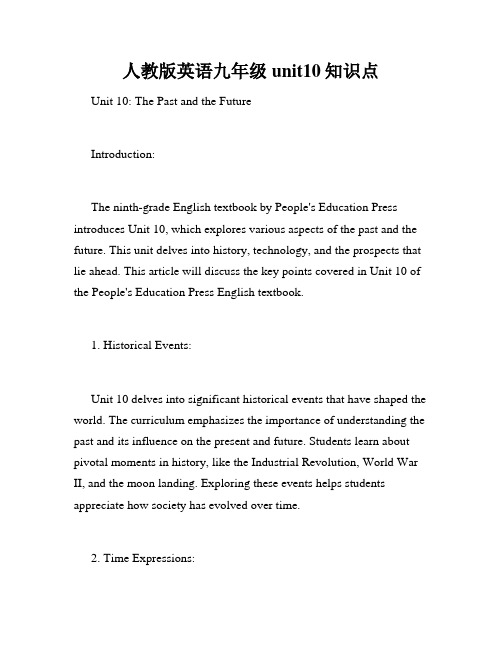
人教版英语九年级unit10知识点Unit 10: The Past and the FutureIntroduction:The ninth-grade English textbook by People's Education Press introduces Unit 10, which explores various aspects of the past and the future. This unit delves into history, technology, and the prospects that lie ahead. This article will discuss the key points covered in Unit 10 of the People's Education Press English textbook.1. Historical Events:Unit 10 delves into significant historical events that have shaped the world. The curriculum emphasizes the importance of understanding the past and its influence on the present and future. Students learn about pivotal moments in history, like the Industrial Revolution, World War II, and the moon landing. Exploring these events helps students appreciate how society has evolved over time.2. Time Expressions:A crucial part of learning any language is understanding how to express time accurately. Unit 10 of the textbook introduces various time expressions, such as "in the past," "in the future," "just now," and "for a long time." Students learn how to use these expressions in sentences, allowing them to effectively communicate their thoughts and experiences regarding time frames.3. The Tenses:Unit 10 revisits and expands upon the study of tenses. The past, present, and future tenses are explored in greater detail. Students learn how to construct sentences in each tense, helping them become more proficient in expressing themselves accurately. Additionally, they learn about the differences between simple, continuous, and perfect tenses, enhancing their understanding of English grammar.4. Technological Advances:The modern world is heavily influenced by technological advancements. Unit 10 focuses on significant technological achievements throughout history and predictions about the future. Students study revolutionary developments such as the invention of thetelephone, the internet, and artificial intelligence. They also speculate on future technologies, examining possibilities like virtual reality and renewable energy sources.5. Conditional Sentences:Conditional sentences are essential for expressing hypothetical situations or outcomes. Unit 10 introduces various types of conditionals, including zero, first, second, and third conditionals. Students learn how to construct these sentences accurately and use them to express their thoughts about past and future possibilities. Mastering conditional sentences enhances their language skills and enables them to communicate complex ideas effectively.6. The Past and Future in Literature:Literature often explores themes related to the past and future. In Unit 10, students are exposed to famous works of literature that touch upon these themes. They read excerpts from classic novels and poems and analyze the authors' perspectives on time and historical events. This exercise not only fosters language skills but also cultivates critical thinking and literary appreciation.Conclusion:Unit 10 of the People's Education Press English textbook provides ninth-grade students with a comprehensive understanding of various aspects related to the past and the future. From historical events to time expressions, tenses, technological advances, and literature, this unit introduces valuable knowledge and language skills. By studying these topics, students can develop a broader perspective on the world and enhance their language proficiency.。
人教版九年级英语全一册:Unit 10语法知识点复习提纲(全面,必备!)

人教版九年级英语全一册:Unit 10语法知识点复习提纲重点短语、重点句型知识点、交际用语、语法、单元同步书面表范文达大全Unit 10 You’re supposed to shake hands.一、重点短语Section A 1a-1c1.握手shake hands2.美国the United States=the USA=the America=the US3.第一次for the first time4.在韩国in Korea5.第一次见面meet for the first time6.做某事......How about/What aboutSection A 2a-2c7.错误的方式wrong way8.穿错了衣服wear the wrong clothes9.下一次next time10.......的欢迎会the welcome party for11.外国学生foreign students12.昨晚last night13.新朋友new friends14.和某人交朋友make friends with sb.15.一......就......as soon as16.伸出,递出hold out17.在日本in Japan18.彼此,互相one another=each other19.鞠躬回礼return the bow20.去年last year21.做了同样的事do the same things22.伸出某人的手hold out one’s hand23.令某人吃惊/惊讶的是to one’s surprise24.在我的双颊上on both sides of my face25.发现,找出,查明,弄清find outSection A 3a-3c26.出生于,来自be from=come from27.对(时间)很随意/放松relax about time28.东奔西跑rush around29.有点晚a little late30.迟到一点arrive a bit late31.珍惜时间,重视时间value the time32.和某人一起度过/消磨spend with sb.33.日常生活everyday lives34.顺便访问/拜访drop by35.有时间have time36.必须have to/must+v-原形37.制定计划make plans38.互相亲吻脸颊kiss each other on the side of the face39.四处走走,到处走走walk around40.市中心,镇中心town center41.按时be on time42.及时be in time43.......的首都the capital of44.毕竟,终究after all45.在中午at noon46.大动肝火,很生气get mad47.努力,作出努力make an effort48.早早地离开家,提前出门leave the house early49.交通拥堵,交通高峰期heavy traffic50.拜访朋友,门拜访朋友visit a friend’s house51.拜访朋友,看望朋友see friends52.不是什么大事。
人教版九年级英语第十单元知识点

1. You are supposed to shake hands.be supposed to do…应该……被期望做……,当句子的主语是人时,它可以用来表示劝告,建议,义务,责任等,意思是“to be expected to do sth., or to have to do sth.”“(按规定、习惯、安排等)应该做某事,可用来表示劝告、建议、义务、责任等,相当于should的用法。
否定形式为“be not supposed to do sth.”表示不该或禁止做的情。
e.g. If you want to eat ice-cream, you are supposed to ask you mum. 如果你想吃冰淇淋,应该先问问你妈妈。
e.g. You’re supposed to ask the teacher if you want to leave the classroom.如果你要离开教室,应该先问问老师。
We are not to supposed to play football on Sunday. 不准我们在星期日踢足球。
2. That’s how people in Japan are expected to greet each other.greet =to welcome or say “hello”动词“问候,打招呼”e.g. He greeted her by saying “good morning”. 他向她打招呼说“早上好”。
She greeted me with a friendly smile. 她向我微笑致意。
be expected to表达“被期许(预期)会做某事, 希望做某事,表示一种可能性。
e.g. She was expected to arrive before dinner. 希望她晚餐前到达。
be supposed to do相对于be expected to do主观性更强一些。
人教版九年级英语第十单元知识点总结(推荐文档).doc
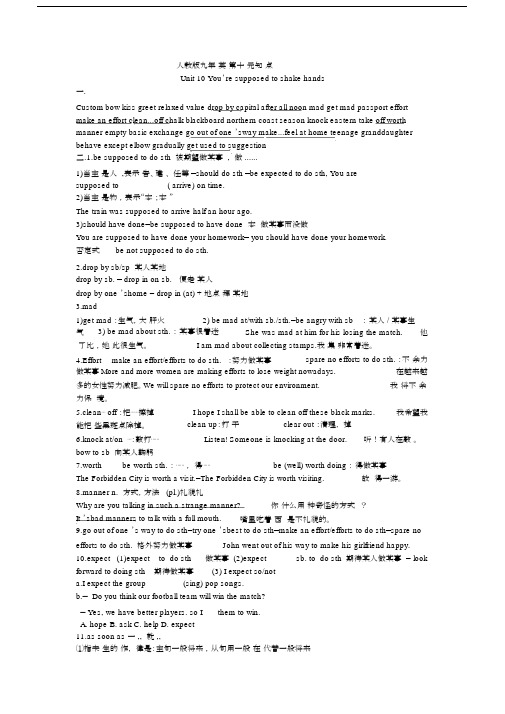
人教版九年英第十元知点Unit 10 You’re supposed to shake hands一.Custom bow kiss greet relaxed value drop by capital after all noon mad get mad passport effort make an effort clean...off chalk blackboard northern coast season knock eastern take off worth manner empty basic exchange go out of one ’sway make...feel at home teenage granddaughter behave except elbow gradually get used to suggestion二.1.be supposed to do sth 被期望做某事 ,做 ......1)当主是人 ,表示告、建、任等 =should do sth =be expected to do sth, You aresupposed to___________( arrive) on time.2)当主是物,表示“本;本”The train was supposed to arrive half an hour ago.3)should have done=be supposed to have done 本做某事而没做You are supposed to have done your homework= you should have done your homework.否定式be not supposed to do sth.2.drop by sb/sp 某人某地drop by sb. = drop in on sb. 便走某人drop by one ’shome = drop in (at) + 地点拜某地3.mad1)get mad :生气,大肝火2) be mad at/with sb./sth.=be angry with sb :某人 / 某事生气3) be mad about sth. :某事很着迷She was mad at him for his losing the match. 他了比,她此很生气。
九年级英语unit10知识点归纳总结

九年级英语unit10知识点归纳总结九年级英语Unit 10知识点归纳总结九年级英语Unit 10主要包含了“Pollution”(污染)这一主题。
本单元的学习目标主要集中在以下几个方面:污染的种类、对环境的影响、如何保护环境以及呼吁人们行动起来。
一、污染的种类1. 空气污染学习污染产生的原因、影响以及如何改善空气质量。
例如,汽车尾气、工厂废气等对空气质量的污染。
2. 水污染探讨水污染的原因、对生态系统和人类健康的危害,以及如何净化水源。
例如,废弃物和化学物质对水体的污染。
3. 声音污染了解噪声对人们身心健康的影响,以及减少噪音污染的方法。
比如,交通、工厂和建筑施工等带来的噪音。
二、对环境的影响1. 污染对生态系统的影响学习了解污染对自然环境、动植物以及生态平衡的危害。
指出如何保护生态平衡,减少人类活动对自然环境的破坏。
2. 污染对人类健康的影响探讨污染对人类健康的潜在风险,如呼吸系统疾病、水源感染等。
呼吁保护环境、减少对污染物的暴露,以改善人类的健康状况。
三、保护环境的方法1. 减少污染源介绍如何减少污染产生的源头,例如使用清洁能源、改善工业和农业生产过程等。
2. 回收利用强调废物的回收利用,减少对资源的浪费,并推广环保意识。
3. 提倡低碳生活鼓励人们采取低碳生活方式,如步行、骑自行车或使用公共交通工具,减少汽车尾气对空气的污染。
四、呼吁行动号召人们行动起来,通过个人的努力来保护环境。
我们每个人都应该采取行动,保护我们的地球家园。
五、总结本单元主要介绍了“Pollution(污染)”这一主题。
通过学习相关知识,我们深刻认识到污染的严重性以及对环境和人类健康的影响。
只有我们每个人都积极行动起来,减少污染、保护环境,才能创造一个更美好的未来。
总之,通过学习九年级英语Unit 10中的知识点,我们能够更好地了解污染的种类、对环境的影响,以及如何保护环境和呼吁人们行动起来。
希望大家能够认真对待这一问题,并为保护地球共同努力。
人教版九年级英语Unit10单元知识点梳理

Unit 10 You're supposed to shake hands.一、短语:1.be supposed to do sth应该做…2.be expected to do sth.应该/被期望做…3.shake hands(with…)(和…)握手4.bow to sb.向某人鞠躬5.for the first time首次,第一次6.people in Korea韩国的人们7.greet sb.(in)the wrong way以错误的方式问候某人8.be invited to sw.被邀请去…...9.be invited to do sth.被邀请做…10.welcome party欢迎会11.as soon as一…就…...(引导时间状从)12.as soon as sb can尽可能快的......13.hold out(my hands)伸出(我的手)14.on both sides of my face在我的两个脸颊上15.be from=come from来自16.be relaxed about对…放松/随意17.a bit/little late晚一点18.value the time we spend with sb珍惜我们与某人度过的时间19.in our everyday lives在我们的日常生活中20.drop by顺便拜访,随便进入21.make plans(to do sth.)计划做某事22.plan to do sth.计划做某事23.on the side of the face在脸的一侧24.the town center在城镇中心25.as many as sb can=as many as possible尽可能多的…26.be on time守时27.the capital of clocks and watches钟表之都28.after all毕竟,终归29.at noon在中午30.15 minutes late迟到15分钟二、重点句子:1.Where I’m from,we’re pretty relaxed about time.我所在的地方,对时间是相当宽松的。
初三英语第十单元知识点总结归纳
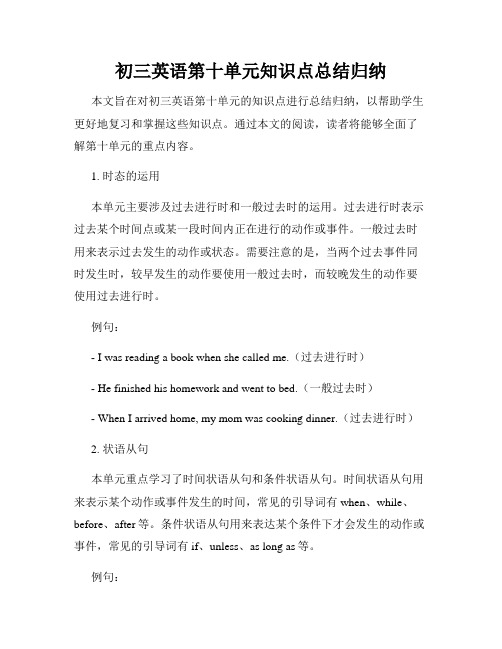
初三英语第十单元知识点总结归纳本文旨在对初三英语第十单元的知识点进行总结归纳,以帮助学生更好地复习和掌握这些知识点。
通过本文的阅读,读者将能够全面了解第十单元的重点内容。
1. 时态的运用本单元主要涉及过去进行时和一般过去时的运用。
过去进行时表示过去某个时间点或某一段时间内正在进行的动作或事件。
一般过去时用来表示过去发生的动作或状态。
需要注意的是,当两个过去事件同时发生时,较早发生的动作要使用一般过去时,而较晚发生的动作要使用过去进行时。
例句:- I was reading a book when she called me.(过去进行时)- He finished his homework and went to bed.(一般过去时)- When I arrived home, my mom was cooking dinner.(过去进行时)2. 状语从句本单元重点学习了时间状语从句和条件状语从句。
时间状语从句用来表示某个动作或事件发生的时间,常见的引导词有when、while、before、after等。
条件状语从句用来表达某个条件下才会发生的动作或事件,常见的引导词有if、unless、as long as等。
例句:- I will call you when I arrive at the airport. (时间状语从句)- If it rains tomorrow, we will stay at home.(条件状语从句)3. 动词的被动语态被动语态是指主语是动作的承受者而非执行者。
被动语态的构成:be动词 + 及物动词的过去分词形式。
需要注意的是,有些动词不常用于被动语态。
例句:- The book was written by Mark Twain.(被动语态)4. 名词性从句名词性从句用作主语、宾语或表语,起到名词的作用。
名词性从句有三种类型:主语从句、宾语从句和表语从句。
新人教版九年级英语unit10知识点归纳

新人教版九年级英语unit10知识点归纳Unit 10: The Mystery of the RainforestIntroductionUnit 10 of the New Edition Grade 9 English textbook takes us on a fascinating journey into the heart of the rainforest. This unit is packed with knowledge about the biodiversity, environmental conservation, and the significance of the rainforest ecosystem. Let's dive in and explore the rich content of Unit 10.The Importance of RainforestsRainforests are incredibly vital to the health of our planet. They help to regulate the global climate, provide a home to countless species, and offer numerous resources for human beings. The rainforests act as the "lungs of the Earth," absorbing carbon dioxide and releasing oxygen into the atmosphere. Moreover, they are a source of medicinal plants and play a crucial role in maintaining the water cycle. Without rainforests, our planet would suffer from the adverse effects of climate change, loss of biodiversity, and disrupted ecological balance.Biodiversity in the RainforestThe rainforest is a treasure trove of biodiversity. It is estimated that around 50% of the world's plants and animal species call the rainforest their home. This incredible variety of life forms plays a vital role in maintaining the health and resilience of the ecosystem. The diverse array of plants and trees create a complex web of ecological relationships, contributing to the stability of the rainforest. It is essential for us to understand the value of preserving biodiversity and take steps to protect these fragile ecosystems.Threats to the RainforestUnfortunately, rainforests face numerous threats. Deforestation is one of the primary concerns plaguing these ecosystems. Trees are cut down to clear land for agriculture, logging, and urbanization, leading to habitat loss and an irreversible impact on biodiversity. Additionally, illegal hunting and the unsustainable extraction of resources are rapidly depleting the delicate balance of the rainforest. It is crucial for governments, organizations, and individuals to come together and implement sustainable practices for the preservation of these valuable ecosystems.Conservation EffortsVarious organizations and initiatives have been working tirelesslyto conserve rainforests. One example is the establishment of national parks and protected areas, where human activities are strictly regulated to minimize the impact on the ecosystem. Sustainable forestry practices, such as selective cutting and reforestation, are being promoted to curb deforestation. Additionally, raising awareness about the importance of rainforest conservation among local communities and the global population is essential in fostering a sense of responsibility and inspiring action.The Role of Education in Rainforest ConservationEducation plays a critical role in rainforest conservation. By teaching students about the significance of rainforests, you equip them with the knowledge and understanding required to take action. Educating young minds about the complexity of rainforest ecosystems, the importance of biodiversity, and the consequences of deforestation instills a sense of responsibility and empowers them to make informed decisions that benefit the environment. Education is a powerful tool that can inspire the next generation to protect and preserve our precious rainforests.ConclusionUnit 10 of the New Edition Grade 9 English textbook offers profound insights into the fascinating world of rainforests. It illustrates the importance of rainforests in sustaining life on Earth, the threats they face, and the urgent need for their conservation. By immersing ourselves in the knowledge contained within this unit, we gain a deeper understanding of the significance of rainforests and are equipped to become advocates for their protection. Let us embrace this knowledge and take action to ensure the future of these incredible ecosystems for generations to come.。
人教版九年级英语Unit 10知识点总结

九年级英语Unit 10 You’re supposed to shake hands 讲义一、词性转换Section A1. greet → (n.) greeting2. relaxed → (v.) relax3. value → (adj.) valuable4. mad → (n.) madness5. northern → (n.) north6. eastern – (n.) eastSection B7. basic → (n) base8. gradually→ (adj.) gradual9. suggestion → (v.) suggest二短语归纳1. shake hands 握手2. for the first time 第一次;首次3. be expected to 被期望4. arrive at 到达5. make mistakes 犯错误6. as soon as 一……就……7. hold out 伸出8. greet each other 相互打招呼9. to one’s surprise 使某人吃惊的是10. on both sides of 在……的两边11. find out 查明;弄清12. everyday lives 日常生活13. drop by 顺便访问;随便进入14. make plans to do sth. 计划做某事15. on time 准时16. after all 毕竟;终归17. get mad 大动肝火;气愤18. make an effort 作出努力19. no big deal 没什么大事20. clean…off 把……擦掉21. take of 脱下(衣服);(飞机等)起飞22. point at 指向;对准23. student exchange program交换生项目24. go out of one’s way 特地;格外努力25. make…feel at home 使(某人)感到宾至如归26. because of 由于27. cut up 切碎28. get used to 习惯于29. be excited about 对……感到兴奋30. look forward to doing sth.盼望做某事31. show up 出现三.句型集萃1. be supposed to do sth.应该做某事2. be expected to do sth. 被期望应该做某事3. It’s impolite if you… 如果你……是不礼貌的4. I wouldn’t mind that! 我不会介意这个5. It’s + adj. + for sb. to do sth 某人做某事是……的6. v. + as + adj + as + sb. can 尽可能……做某事7. It is + adj. + to do sth. 做某事是……的8. keep sb. waiting 让某人等待五、重点句子1. That’s how people in Japan are expected to greet each other. 那是人们在日本彼此打招呼应该做的。
九年级人教版英语unit10知识点
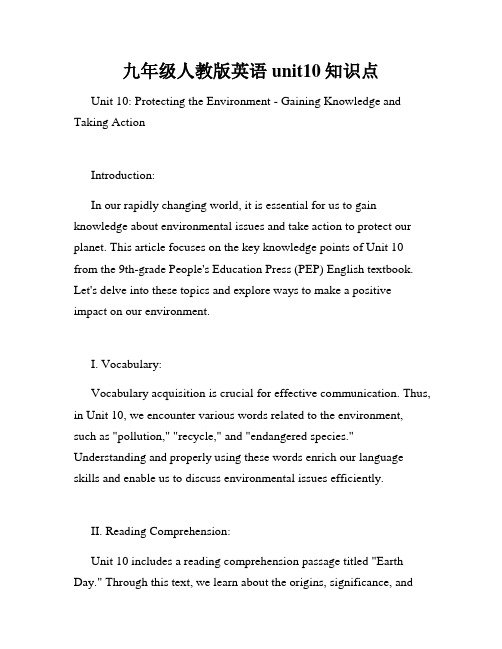
九年级人教版英语unit10知识点Unit 10: Protecting the Environment - Gaining Knowledge and Taking ActionIntroduction:In our rapidly changing world, it is essential for us to gain knowledge about environmental issues and take action to protect our planet. This article focuses on the key knowledge points of Unit 10 from the 9th-grade People's Education Press (PEP) English textbook. Let's delve into these topics and explore ways to make a positive impact on our environment.I. Vocabulary:Vocabulary acquisition is crucial for effective communication. Thus, in Unit 10, we encounter various words related to the environment, such as "pollution," "recycle," and "endangered species." Understanding and properly using these words enrich our language skills and enable us to discuss environmental issues efficiently.II. Reading Comprehension:Unit 10 includes a reading comprehension passage titled "Earth Day." Through this text, we learn about the origins, significance, andactivities associated with Earth Day. This passage emphasizes the importance of this annual event in raising awareness and encouraging environmental action. By comprehending and analyzing such texts, we gain insight into environmental campaigns and learn how to protect and preserve our surroundings.III. Listening Skills:Listening comprehensively is a vital component of language learning. In Unit 10, we improve our listening skills by engaging with audio materials related to protecting the environment. By actively listening and responding to dialogues and monologues, we can better understand environmental problems and solutions, such as reducing carbon emissions, conserving water, and promoting clean energy.IV. Grammar:Proper grammar usage enables us to express our ideas accurately. In this unit, we focus on learning the present perfect tense, which helps us discuss past actions and their ongoing relevance to the present. This tense is particularly useful when discussing environmental issues, as it allows us to link past actions to current consequences and motivate us to take action to rectify the damage caused.V. Writing Skills:Writing is a powerful tool for expressing our thoughts and ideas. In Unit 10, we hone our writing skills by composing environmentally focused essays, letters, and speeches. By organizing our thoughts and presenting them coherently, we can effectively convey the importance of environmental protection and inspire others to join us in making a positive impact.VI. Speaking Practice:Effective verbal communication is essential in conveying messages and ideas. Unit 10 provides opportunities for us to practice speaking skills through group discussions, role-plays, and presentations centered around environmental issues. By participating actively and sharing our opinions, we not only improve our speaking abilities but also learn to collaborate with others in finding sustainable solutions.Conclusion:Unit 10 of the 9th-grade PEP English textbook offers valuable knowledge and skills related to environmental protection. By acquiring a robust vocabulary, honing our reading comprehension, listening, grammar, writing, and speaking abilities, we become better equipped to address environmental challenges. Let us apply this knowledge in our daily lives and take responsibility for protecting our planet, ensuring a sustainable future for generations to come.。
人教版英语九全单元unit 10 知识点
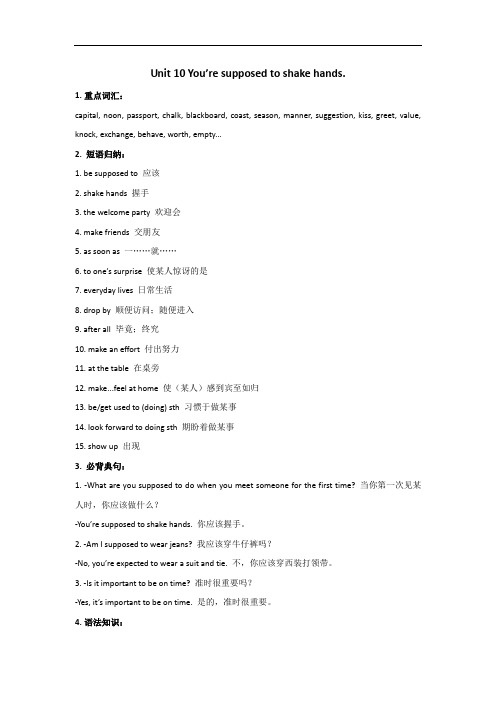
Unit 10 You’re supposed to shake hands.1.重点词汇:capital, noon, passport, chalk, blackboard, coast, season, manner, suggestion, kiss, greet, value, knock, exchange, behave, worth, empty...2. 短语归纳:1. be supposed to 应该2. shake hands 握手3. the welcome party 欢迎会4. make friends 交朋友5. as soon as 一……就……6. to one’s surprise 使某人惊讶的是7. everyday lives 日常生活8. drop by 顺便访问;随便进入9. after all 毕竟;终究10. make an effort 付出努力11. at the table 在桌旁12. make...feel at home 使(某人)感到宾至如归13. be/get used to (doing) sth 习惯于做某事14. look forward to doing sth 期盼着做某事15. show up 出现3. 必背典句:1. -What are you supposed to do when you meet someone for the first time? 当你第一次见某人时,你应该做什么?-You’re supposed to shake hands. 你应该握手。
2. -Am I supposed to wear jeans? 我应该穿牛仔裤吗?-No, you’re expected to wear a suit and tie. 不,你应该穿西装打领带。
3. -Is it important to be on time? 准时很重要吗?-Yes, it’s important to be on time. 是的,准时很重要。
人教版九年级全册英语第10单元知识点复习提纲

人教版九年级全册英语第10单元知识点复习提纲1. besides/except prep. 除……之外(1). besides的意思是“除……之外,还有……”;I have three other pens besides this one. 除了这支笔外,我还有另外三支笔。
(2). except的意思是“除……之外,没有……”,可由but替换,but 在此用作介词。
Everybody is here except/but Mary. 除了Mary之外,大家都来了。
expect v. 期望如:You got here earlier than I had expected. 你们到得比我预料得早。
(1). expect to do 期盼做某事如:I expect to meet her next Tuesday. 我期待下周二与她相见。
(2). expect sth. 期盼某事如:None of us expected it. 这是我们谁也没料想到的。
3. beside prep. 在……旁边如:There is a table beside the bed. 床边有一张桌子。
2.☆used to do sth.过去常常做某事如:I used to run into him from time to time.我过去时常碰上他。
☆be/get/become used to sth. / doing sth. 习惯于(做)某事如:You'll soon get used to living in the countryside.你很快就会适应乡村生活的。
☆be used to do sth.=be used for doing sth. 被用来做某事A watch is used to tell the time.手表被用来看时间。
☆be used as...被当作……用如:The knife can be used as a weapon when you are in danger.在你身处险境之时,这把小刀可用作防身的武器。
- 1、下载文档前请自行甄别文档内容的完整性,平台不提供额外的编辑、内容补充、找答案等附加服务。
- 2、"仅部分预览"的文档,不可在线预览部分如存在完整性等问题,可反馈申请退款(可完整预览的文档不适用该条件!)。
- 3、如文档侵犯您的权益,请联系客服反馈,我们会尽快为您处理(人工客服工作时间:9:00-18:30)。
人教版九年级英语第十单元知识点总结Unit 10 You’re supposed to shake hands一.单词Custom bow kiss greet relaxed value drop by capital after all noon mad get mad passport effort make an effort clean...off chalk blackboard northern coast season knock eastern take off worth manner empty basic exchange go out of one’s way make...feel at home teenage granddaughter behave except elbow gradually get used to suggestion二.1.be supposed to do sth 被期望做某事,应该做......1)当主语是人时,表示劝告、建议、责任等=should do sth =be expected to do sth,You are supposed to___________( arrive) on time.2)当主语是物时,表示“本应;本该”The train was supposed to arrive half an hour ago.3)should have done=be supposed to have done本应该做某事而没做You are supposed to have done your homework= you should have done your homework.否定式为be not supposed to do sth.2.drop by sb/sp 某人某地drop by sb. = drop in on sb. 顺便走访某人drop by one’s home = drop in (at) +地点拜访某地3.mad1)get mad:生气,大动肝火2) be mad at/with sb./sth.=be angry with sb:对某人/某事生气3) be mad about sth.:对某事很着迷She was mad at him for his losing the match. 他输了比赛,她为此很生气。
I am mad about collecting stamps. 我对集邮非常着迷。
4.Effort make an effort/efforts to do sth.:努力做某事spare no efforts to do sth.:不遗余力做某事More and more women are making efforts to lose weight nowadays. 现在越来越多的女性努力减肥。
We will spare no efforts to protect our environment. 我们将不遗余力保护环境。
5.clean…off:把……擦掉I hope I shall be able to clean off these black marks. 我希望我能把这些黑斑点除掉。
clean up:打扫干净clear out:清理,丢掉6.knock at/on …:敲打……Listen! Someone is knocking at the door. 听!有人在敲门。
bow to sb 向某人鞠躬7.worth be worth sth.:值……钱,值得……be (well) worth doing:值得做某事The Forbidden City is worth a visit. =The Forbidden City is worth visiting. 故宫值得一游。
8.manner n. 方式,方法(pl.)礼貌礼仪Why are you talking in such a strange manner? 你为什么用这种奇怪的方式说话?It’s bad manners to talk with a full mouth. 嘴里吃着东西说话是不礼貌的。
9.go out of one’s way to do sth=try one’s best to do sth=make an effort/efforts to do sth=spare no efforts to do sth. 格外努力做某事John went out of his way to make his girlfriend happy. 10.expect (1)expect to do sth 预计做某事(2)expect sb. to do sth 期待某人做某事= look forward to doing sth 期待做某事(3) I expect so/nota.I expect the group ________(sing) pop songs.b.—Do you think our football team will win the match?—Yes, we have better players. so I ___them to win.A. hopeB. askC. helpD. expect11.as soon as 一……就……⑴指未发生的动作,规律是:主句一般将来时,从句用一般现在时代替一般将来时如:I will tell him the news as soon as he comes back。
⑵指紧接着发生的两个短动作,主从句都用一般过去时如He took out his English books as soon as he sat downI’ll go to visit my aunt in England ___the summer holidays start.A.while B.since C. until D. as soon as13.We often just walk around the town center, seeing as many of our friends as we can.walk around意为“到处走走”、“闲逛”的意思,“没有目的的行走”as... as one can/could 尽可能......,尽量...... = as ... as possibleseeing为现在分词短语作伴随状语,说明谓语动作发生时,另一个动作也在发生。
The teacher came into the classroom, holding a book in his hand.14.point at,point to,point outpoint at习惯上表示指向离说话人较近的事物,意为“指着”,at是介词,着重于指的对象。
point to用来表示指向离说话人较远的事物,意为“指向”,to也是介词,着重于指的方向。
point out表示的是给某人指示方向,要点或错误等,意为“指出”,out是副词。
He pointed _______ the house on the other side of the river and said,“That’s my home.”Don’t point ________ the words while you are reading.The teacher pointed _______ many mistakes in my homework.15.except “除……之外”(不包含在内)besides “除……之外(还)”(指除去的部分包括在前面提到的范围之内。
)All of us went to the park _____ Bob. He had to look after his sister. A. besides B. with C. Except —Is Jack good at basketball?—Yes. ______ basketball he is also good at table tennis.A.ExceptB. BesidesC. ButD. Beside16.for the first time /at first/first of all/the first timeat first起先;最初(类似at the beginning 最初,刚开始)We didn't trust him at first but..最初我们不相信他但后来相信了first of all 首先,关键点在于强调最重要的是,第一点是When you want to work for our country in the future, ____, we should have strong body and rich knowledge.A. at first B. first of all C. for the first time D. after allfor the first time 第一次the first time则是引导时间状语从句,when怎么引导时间状语从句的,the first time就能放在什么位置.只要记住把the first time看成是when,虽然意思不同,但用法相同,比如I thought her honest the first time I met her.17.hold out 伸出;坚持hold out one’s hands hold out my hand 伸出我的手She held out her hand to take the rope. 她伸手去抓那根绳子。
hold on 抓住; (打电话时用语)别挂断...hold up 举起;. hold back 阻碍; hold off 不使挨近; 挡住; 耽搁; 离开hold down 压制; 压缩hold on to 坚持; 不放弃hold in 压住; 忍耐; 抑制Li Lei wanted to tell her everything, but something made him ______.A.hold upB. hold backC. hold onD. hold outI want to know if an English Singing Competition ____ next month.A. will holdB. will be heldC. holdsD. is held18. We don’t like to rush around, so we don’t mind if people are a little late sometimes.rush out 冲出去rush hour 交通拥挤时间rush around 匆匆忙忙;东奔西跑run away =flee 逃跑run out of =use up 用完run off 跑掉(其后不直接跟宾语,常与to/ from 连用)All the students ran off from their classroom to the playground when the earthquake happened.19.If you tell a friend you’re going to their house for dinner,it’s OK if you arrive a bit late.a bit 稍微;有点,修饰形容词、副词及它们的的比较级。
